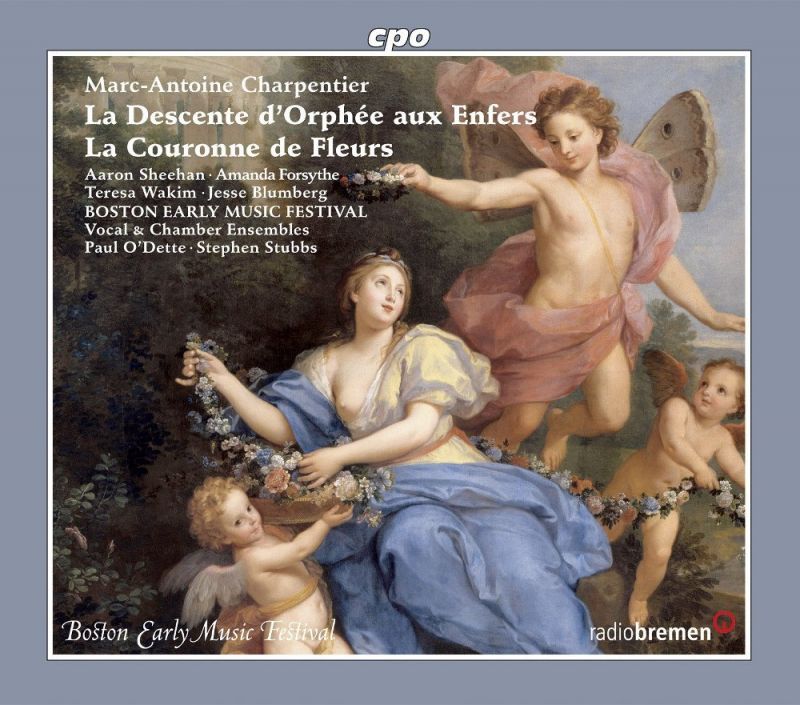CHARPENTIER Le Descente D'Orphee Aux Enfers. La Couronne de Fleurs
View record and artist detailsRecord and Artist Details
Composer or Director: Marc-Antoine Charpentier
Genre:
Opera
Label: CPO
Magazine Review Date: 09/2014
Media Format: CD or Download
Media Runtime: 79
Mastering:
DDD
Catalogue Number: CPO777 876-2

Tracks:
| Composition | Artist Credit |
|---|---|
| (La) Descente d'Orphée aux enfers |
Marc-Antoine Charpentier, Composer
Aaron Sheehan, Orphée, Tenor Amanda Forsythe, Euridice, Soprano Boston Early Music Festival Chorus Boston Early Music Festival Orchestra Dorothee Mields, Proserpine; Enone, Soprano Douglas Williams, Pluton, Bass-baritone Jason McStoots, Ixion, Tenor Jesse Blumberg, Apollon; Titye, Baritone Marc-Antoine Charpentier, Composer Paul O'Dette Stephen Stubbs Teresa Wakim, Daphné; Aréthuse, Soprano Zachary Wilder, Tantale, Tenor |
| (La) couronne de fleurs |
Marc-Antoine Charpentier, Composer
Amanda Forsythe, Roselie, Soprano Boston Early Music Festival Chorus Boston Early Music Festival Orchestra Dorothee Mields, Amaranthe, Soprano Douglas Williams, Sylvandre, Bass-baritone Jason McStoots, Forestan, Tenor Jesse Blumberg, Pan; Un Berger, Baritone Marc-Antoine Charpentier, Composer Mireille Lebel, Hyacinthe, Mezzo soprano Paul O'Dette Stephen Stubbs Teresa Wakim, Flore, Soprano Zachary Wilder, Mirtil, Tenor |
Author: Julie Anne Sadie
La descente d’Orphée, based on Ovid, is a two-act operatic fragment, possibly never completed. La couronne de fleurs is a panegyric to Louis XIV, apparently composed to celebrate the Truce of Ratisbon. Both call for similar solo vocal and choral resources. As in Charpentier’s day, many of the singers take multiple roles in both works, one present exception being the tenor Aaron Sheehan, who sings the role of Orpheus, a finely nuanced interpretation, if less overtly dramatic than Paul Agnew’s 1995 performance. Amanda Forsythe is a charming Euridice and Rosélie, Teresa Wakim a beautifully styled Flore, and Dorothee Mields a compelling Amaranthe and Proserpine. Among the male cameo roles, Jesse Blumberg’s Pan, Jason McStoots’s Forestan and Douglas Williams’s Sylvandre and obliging Pluton deserve praise. The soprano duet (tr 19) and male-voice trio (trs 28 and 30) in La descente d’Orphée stand out among the choral contributions in both works.
Charpentier’s stated instrumental forces are modest: two treble parts, two bass viols and continuo (a third bass viol and harpsichord) for the opera and, more specifically, two treble viols and continuo for La couronne de fleurs. Both works include cheerful ouvertures and diverting entrées (dances), prompting O’Dette and Stubbs to employ larger and more varied resources to enhance their characterisation, though the dramatic action is accompanied mainly by the continuo instruments. The exceptions are the Prelude to Act 2 scene 2 and the series of ‘Airs d’Orphée’ in La descente d’Orphée, which, unusually, rely upon the artfulness of the two bass viol players, Laura Jeppeson and Cristel Thielmann. Bravo!
Discover the world's largest classical music catalogue with Presto Music.

Gramophone Digital Club
- Digital Edition
- Digital Archive
- Reviews Database
- Full website access
From £8.75 / month
Subscribe
Gramophone Full Club
- Print Edition
- Digital Edition
- Digital Archive
- Reviews Database
- Full website access
From £11.00 / month
Subscribe
If you are a library, university or other organisation that would be interested in an institutional subscription to Gramophone please click here for further information.




